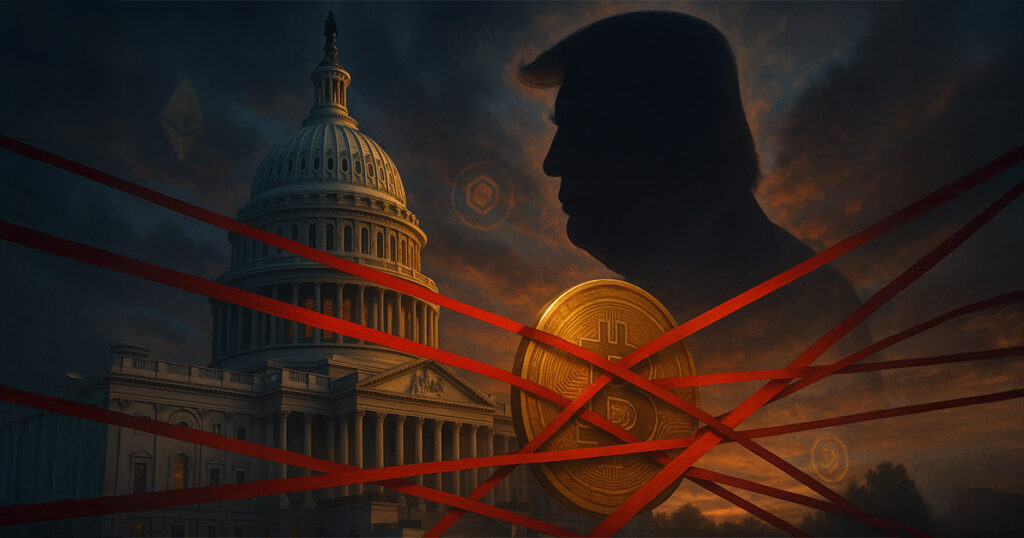
Discussions about the personal enrichment and potential conflicts of interest arising from US President Donald Trump’s Crypto -Activa companies have received steam last week. These ensure not only the progress of the Stablecoin legislation, but also a broader crypto policy. The founder of Fintech Venture Capital Fund Launchpad Capital, Ryan Gilbert, said CNBC:
“It is a shame that personal matters stand in the way of good policy … I hope that everyone in the administration, including the president, will avoid a good policy.”
The Stablecoin legislation, known as the Guiding and Festing National Innovation for Us Stablecoins (Genius) ACT, aims to set up a regulatory framework for American payment stablecoins.
The bill “is generally seen if the legislation that will be the easiest to get through,” Katrina Paglia, Chief Legal Officer at Risk Capital Capital, told CNBC earlier this week. That is why Paglia was disappointed when the Genius Act de Senate did not accept a vote of 48-49 on Thursday, but was not ‘surprised’.
Ethical worries about the profit of Trump of crypto-assets and companies had blocked the discussion about the draw of the American crypto-market structure that was planned before 6 May. The account of the market structure was introduced on Monday, with the aim of providing much needed regulatory clarity. The bill was intended to offer clear guidelines on how the Securities and Exchange Commission (SEC) and the Commodity Futures Trading Commission (CFTC) would classify and supervise digital assets.
The succession of events that have increased conflicts of interest
Days before Trump’s inauguration, he launched the official $ Trump Memecoin, whose price according to a record high of $ 75 on January 19, according to CryptoSlate facts.
The price of $ Trump fell soon after Trump’s inauguration, which means that small investors lose more than $ 2 billion. In the meantime, Trump-linked companies, which check 80% of Memecoin supply by 30 January, earned around $ 100 million in trading costs, Reuters reported in February.
In March, representatives of the Trump family were reportedly in conversation to gain an interest in the American arm of Binance, who paid a historic fine after he had stated guilty of violating anti-money laundering laws in 2023.
On March 13, the Bank Committee of the Senate de Genius Act approved. On March 25, World Liberty Financial, a decentralized financial project that is related to the Trump family, announced plans to launch his own Stablecoin, USD1.
The investment by investment giant MGX in Binance, established in Abu Dhabi, was announced on 12 March. But on 1 May, WLF co-founder confirmed that USD1 was selected to carry out the transaction, according to Reuters. MGX is chaired by Sheikh Tahnoon bin Zayed Al Nahyan, the national security adviser of the VAE and a brother of the Vae President Sheikh Mohammed bin Zayed. Abu Dhabi’s State Field $ 330 billion Wealth Fund Mubadala, is a partner in MGX.
At the end of April, Trump invited the top 220 of his Memecoin holders for a private audience during a gala dinner on 22 May. At the time, the Democratic US Senator called Georgia Jon Ossoff the move a “accused violation”.
Earlier this week, the Financial Times reported that insiders earned nearly $ 100 million by buying the Memecoin of Melania Trump, the American First Lady, hours before the public launch.
Last week the tensions about ‘Trump’s corruption’ strengthened
The brilliant action should sail on. But last weekend, nine Senate Democrats, including four who voted for the bill, said that they would withhold support if the bill was not revised to tackle the national security and money laundering.
On 6 May, congress member Maxine Waters (D-CA), the top democrat in the House Financial Services Committee, used the time to discuss the crypto-market structure law to protest against ‘Trump’s corruption’. Waters stated that Trump earned at least $ 350 million from his memecoin, and added:
“Trump ran on a campaign to put more money in the pockets of Americans – aimed, he just meant his pockets and that of his chatts.”
During the same hearing, Chastity Murphy, senior adviser for financial institutions of the Treasury Department, said that Trump’s crypto empire is a vehicle for “influence on paddling, bribery and regulatory admission”. Representative Stephen Lynch claimed that Trump earned around $ 2.9 billion – almost 40% of his wealth – of his crypto companies.
On May 7, the American senator Mark Kelly introduced the End Crypto Corruption Act to prohibit members of congress and family members “to spend, endorse or sponsor Crypto assets, such as meme coins and stablecoins.” He noticed:
“Trump cashed in his presidency and earns millions from his own crypto coins – this is corruption in broad daylight.”
In a letter on Friday, Democratic senators drove at Treasury Secretary Scott Bessent and Attorney General Pam Bondi to investigate Trump’s ties with Binance, Bloomberg reported. In the meantime, the former Binance CEO Changpeng Zhao (CZ), who served for four months in prison, has requested a grace of Trump.
Senator Jeff Merkley told CNBC in a statement:
“Currently, people who want to cultivate influence with the president can enrich him personally by buying cryptocurrency that he owns or controls … This is a deep corrupt schedule.”
Despite the worries, senators of both parties have already started negotiating since the failed vote on Thursday and they were able to vote again about the Genius Act as soon as next Monday. Most legislators expect that the genius law will eventually pass the Senate and land on Trump’s office, but the timeline is uncertain in the midst of interests.

